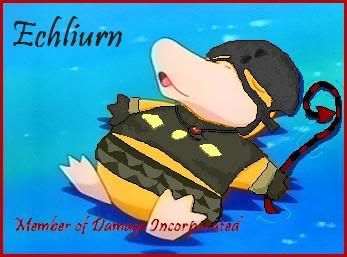Anything Trivia meh...
#27

Posted 04 December 2004 - 01:23 AM
I'm bringing this back up and a friend reminded me of the answer to this question over the phone.
"Don't you like my mouth words?"
Pretty sure that's it.
"Don't you like my mouth words?"
Pretty sure that's it.

^^ Thanks Ayumi, you rock!! ^^
How many five-year-olds could you take in a fight?
Red Carnation, Hibiscus. Spiderflower. White Violet... Peony?
Click here to learn about the language of flowers
#29

Posted 04 December 2004 - 01:30 AM
Ok, here's a nice easy question.
Give me the full quote from the ending in the movie "Hero"
Hint: You'll find it somewhere very obvious.
Give me the full quote from the ending in the movie "Hero"
Hint: You'll find it somewhere very obvious.

^^ Thanks Ayumi, you rock!! ^^
How many five-year-olds could you take in a fight?
Red Carnation, Hibiscus. Spiderflower. White Violet... Peony?
Click here to learn about the language of flowers
#30

Posted 04 December 2004 - 01:31 AM
To reconstitute political life in a state presupposes a good man,
whereas to have recourse to violence in order to make oneself prince in a republic
supposes a bad man. Hence very rarely will there be found a good man ready to use bad
methods in order to make himself prince, though with a good end in view.
Nor will any reasonable man blame him for taking any action,
however extraordinary, which may be of service in the organizing of a kingdom
or the constituting of a republic. It is a sound maxim that reprehensible actions
may be justified by their effects, and that when the effect is good, it always
justifies the action. For it is the man who uses violence to spoil things, not the man
who uses to mend them, that is blameworthy.
A Prince should therefore disregard the reproach of being thought
cruel where it enables him to keep his subjects united and loyal. For he who quells disorder
by a very few signal examples will in the end be more merciful than he who from too
great leniency permit things to take their course and so result in chaos and bloodshed;
for these hurt the whole state, whereas the severities of the Prince injure individuals only.
It is essential therefore, for a Prince who desires to maintain his position,
to have learned how to be other than good, and to use or not use his goodness as necessity requires.
Everyone sees what you seem to be, but few know what you are.
Niccolo Machiavelli: from “The Prince & The Discourses”
whereas to have recourse to violence in order to make oneself prince in a republic
supposes a bad man. Hence very rarely will there be found a good man ready to use bad
methods in order to make himself prince, though with a good end in view.
Nor will any reasonable man blame him for taking any action,
however extraordinary, which may be of service in the organizing of a kingdom
or the constituting of a republic. It is a sound maxim that reprehensible actions
may be justified by their effects, and that when the effect is good, it always
justifies the action. For it is the man who uses violence to spoil things, not the man
who uses to mend them, that is blameworthy.
A Prince should therefore disregard the reproach of being thought
cruel where it enables him to keep his subjects united and loyal. For he who quells disorder
by a very few signal examples will in the end be more merciful than he who from too
great leniency permit things to take their course and so result in chaos and bloodshed;
for these hurt the whole state, whereas the severities of the Prince injure individuals only.
It is essential therefore, for a Prince who desires to maintain his position,
to have learned how to be other than good, and to use or not use his goodness as necessity requires.
Everyone sees what you seem to be, but few know what you are.
Niccolo Machiavelli: from “The Prince & The Discourses”
 Sign In
Sign In Register
Register Help
Help





 MultiQuote
MultiQuote



